
Certain natural products may help stimulate hair growth by affecting stem cell activity in the scalp.

Different stem cells are key for hair growth and health, and understanding their regulation could help treat hair loss.
 2 citations,
August 2019 in “Journal of skin and stem cell”
2 citations,
August 2019 in “Journal of skin and stem cell” The study concludes that regulating apoptosis could lead to new treatments for various skin and hair conditions.
134 citations,
July 2020 in “Experimental dermatology” Hair follicles are normally protected from the immune system, but when this protection fails, it can cause hair loss in alopecia areata.
May 2023 in “Clinical, Cosmetic and Investigational Dermatology” More personalized and effective treatments for androgenetic alopecia are needed.
 January 2022 in “IntechOpen eBooks”
January 2022 in “IntechOpen eBooks” Some lesser-known causes of PCOS include autoimmune issues, genetic mutations, and changes in the body's microbiome.
 1 citations,
July 2017 in “Clinical research in dermatology”
1 citations,
July 2017 in “Clinical research in dermatology” Hair loss, known as Androgenetic Alopecia, is often caused by hormones and can be diagnosed using noninvasive techniques. Treatments include topical minoxidil and oral finasteride, with new treatments being explored. There may also be a link between this type of hair loss and heart disease risk.
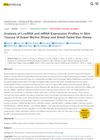
Researchers found genes in sheep that may affect hair growth and wool quality.
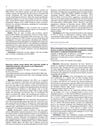 December 2015 in “Vascular Pharmacology”
December 2015 in “Vascular Pharmacology” Different cells affect hair follicle blood vessels, endothelial cells react differently to inflammation and oxidized fats, and prasugrel better protects heart vessels during a procedure than clopidogrel.
 3 citations,
November 2005 in “Dermatologic Surgery”
3 citations,
November 2005 in “Dermatologic Surgery” Aminoguanidine increases a specific growth signal in stored hair grafts, which may help them survive better after being transplanted.
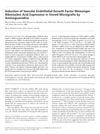 1 citations,
November 2005 in “Dermatologic Surgery”
1 citations,
November 2005 in “Dermatologic Surgery” Aminoguanidine increases VEGF in stored hair micrografts, potentially improving their viability after transplant.
 9 citations,
April 2019 in “International Journal of Molecular Sciences”
9 citations,
April 2019 in “International Journal of Molecular Sciences” Kojyl cinnamate ester derivatives can promote hair growth by increasing adiponectin production in fat tissues.
 2 citations,
January 2019 in “Annals of Dermatology”
2 citations,
January 2019 in “Annals of Dermatology” Melandrium firmum extract helps mice grow hair by blocking a hair loss enzyme and changing hair growth genes.
 13 citations,
October 2013 in “The Journal of Dermatology”
13 citations,
October 2013 in “The Journal of Dermatology” Cepharanthine may help hair growth by increasing IGF-I in scalp cells.
 November 2005 in “Journal of Investigative Dermatology Symposium Proceedings”
November 2005 in “Journal of Investigative Dermatology Symposium Proceedings” The 2004 hair research meeting presented new findings on hair cell differentiation, genetic factors in hair loss, hair pigmentation, and potential targeted therapies.
January 2016 in “대한미용학회지” Lavender oil promotes hair growth in mice.
December 2011 in “대한본초학회지(본초분과학회지)” Gyungohkgo-gamibang extract significantly promotes hair growth and thickness.
 14 citations,
July 2021 in “Biomolecules”
14 citations,
July 2021 in “Biomolecules” Centipeda minima extract helps hair grow by activating important growth signals and could be a promising hair loss treatment.
8 citations,
January 2019 in “The journal of investigative dermatology/Journal of investigative dermatology” Growth hormone is important for regulating human hair growth.
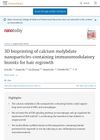 3 citations,
June 2023 in “Nano today”
3 citations,
June 2023 in “Nano today” A special bioink with nanoparticles helps regrow hair by reducing inflammation and promoting hair growth signals.
January 2021 in “대한본초학회지(본초분과학회지)” Achyranthis Radix ethanol extract helps hair grow.

Tomato extract can promote hair growth and prevent hair loss without irritating the skin.
March 2022 in “Molecules” Adenosine can help treat hair loss by promoting hair growth.
173 citations,
July 1995 in “Biochemical and biophysical research communications” Male hormones promote hair cell growth by using a growth factor from nearby skin cells.
 25 citations,
December 2008 in “The Journal of Urology”
25 citations,
December 2008 in “The Journal of Urology” Short-term finasteride treatment may lower some cell death factors in prostate cancer cells.
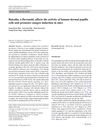 22 citations,
December 2014 in “Naunyn-Schmiedeberg's Archives of Pharmacology”
22 citations,
December 2014 in “Naunyn-Schmiedeberg's Archives of Pharmacology” Baicalin helps hair grow by boosting certain cell activities and speeding up hair cycle in mice.
 18 citations,
September 2011 in “Livestock science”
18 citations,
September 2011 in “Livestock science” Maternal Nano-Se supplements improve fetal hair follicle development in cashmere goats.
10 citations,
December 2018 in “Journal of animal physiology and animal nutrition” Heat stress reduced hair growth and affected related genes in rex rabbits.
 7 citations,
January 2022 in “Molecules”
7 citations,
January 2022 in “Molecules” Tectoridin helps human hair cells grow and makes mouse hair longer, suggesting it could treat hair loss.
5 citations,
February 2016 in “Hanbang an i bi inhu pibugwa hakoeji/Hanbang an'i'bi'in'hu pibu'gwa haghoeji” Microneedle therapy combined with Hwangryeonhaedoktang solution improved hair growth in mice better than microneedle therapy alone.




















